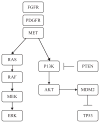Genetic changes in squamous cell lung cancer: a review
- PMID: 22722794
- PMCID: PMC3404741
- DOI: 10.1097/JTO.0b013e31824cc334
Genetic changes in squamous cell lung cancer: a review
Abstract
Identifying specific somatic mutations that drive tumor growth has transformed the treatment of lung cancer. For example, cancers with sensitizing epidermal growth factor receptor mutations and echinoderm microtubule-associated protein-like 4-anaplastic lymphoma kinase translocations can have remarkable responses to epidermal growth factor receptor and ALK inhibitors respectively, leading to significant clinical benefit. However, effective molecularly targeted therapies have disproportionately impacted adenocarcinomas compared to squamous cell carcinomas, and never or light smokers compared to heavy smokers. Further progress in non-small-cell lung cancer will require the identification and effective targeting of molecular alterations in all subtypes of lung cancer. Here, we review the current knowledge about the molecular alterations found in squamous cell carcinoma of the lung. First, we will discuss the ongoing efforts to comprehensively assess the squamous cell carcinoma genome. We will then discuss the evidence supporting the role of specific genes in driving squamous cell carcinomas. By describing the landscape of somatic targets in squamous cell lung cancer, we hope to crystallize the current understanding of potential targets, spur development of therapies that can have clinical impact, and underscore the importance of new discoveries in this field.
Conflict of interest statement
Disclosure: The authors declare no conflict of interest.
Figures
References
-
- American Cancer Society. Cancer Facts & Figures 2012. Atlanta: American Cancer Society; 2012.
-
- Schiller JH, Harrington D, Belani CP, et al. Eastern Cooperative Oncology Group. Comparison of four chemotherapy regimens for advanced non-small-cell lung cancer. N Engl J Med. 2002;346:92–98. - PubMed
-
- Sandler A, Gray R, Perry MC, et al. Paclitaxel-carboplatin alone or with bevacizumab for non-small-cell lung cancer. N Engl J Med. 2006;355:2542–2550. - PubMed
-
- Hainsworth JD, Fang L, Huang JE, et al. BRIDGE: an open-label phase II trial evaluating the safety of bevacizumab + carboplatin/paclitaxel as first-line treatment for patients with advanced, previously untreated, squamous non-small cell lung cancer. J Thorac Oncol. 2011;6:109–114. - PubMed
-
- Scagliotti GV, Parikh P, von Pawel J, et al. Phase III study comparing cisplatin plus gemcitabine with cisplatin plus pemetrexed in chemotherapy-naive patients with advanced-stage non-small-cell lung cancer. J Clin Oncol. 2008;26:3543–3551. - PubMed
Publication types
MeSH terms
Substances
Grants and funding
LinkOut - more resources
Full Text Sources
Other Literature Sources
Medical
Research Materials
Miscellaneous


